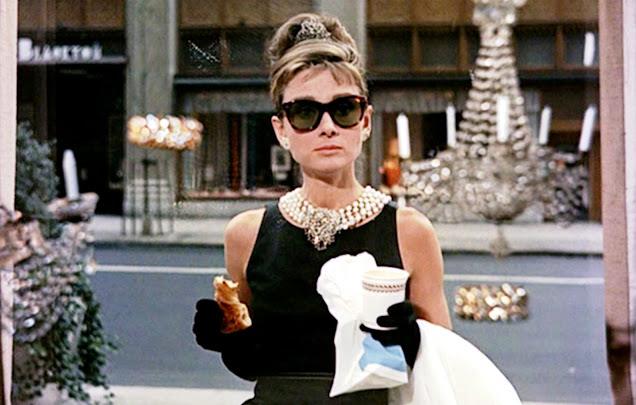Breakfast at Tiffany's
Few things are as iconic as those images of Audrey Hepburn in her petite black dress, holding that ridiculously long cigarette holder. Actually, just Miss. Hepburn herself. Even without the props, she made cinema history with her mere presence in 1961's BREAKFAST AT TIFFANY'S. Her performance is fine, endearing even, but rarely has someone just appeared onscreen and created such an instant cultural benchmark. Even when she's perfectly still, fast asleep, she's one for the ages.
Some actors just have it. I don't imagine you can learn it. Makeup and wardrobe departments do their magic. The lighting can make or break the way audiences perceive those "fabled fools." But folks like Steve McQueen, Robert Redford, Grace Kelly, and Audrey Hepburn possess something even when the crews turn in less than stellar work. Maybe even in spite of that at the worst of moments. I mentioned in another review that Cybill Shepherd, hardly one of our greatest actresses but still one with megawatt star power, left off her makeup to play a grown up Jacy Farrow in TEXASVILLE. She still felt like some sort of cinematic royalty.
Miss Hepburn plays Holly Golightly, perfectly named as her approach to life hardly considers the harsh realities of responsibility. She makes a studied avoidance of serious relationships, favoring the sort that don't witness sunrise. She also, um, collects money for these trysts. Holly's an expatriate country bumpkin whose charm and presence has allowed an acceptance among Manhattan's elite. So popular is Holly that all those patricians will gather for one of her wild parties in her modest apartment, surely a bit of slumming for them. During such a soiree, Holly's L.A. agent/Henry Higgins-type O.J. Berman (Martin Balsam) remarks to Paul (George Peppard) what a dump the place is.
Paul? He's the handsome writer who's just moved into Holly's apartment building. He has this curious relationship with a woman named Emily (Patricia Neal) who identifies herself as his decorator. But for what services is she leaving cash on the dresser when she exits in the middle of the night?
George Axelrod's screenplay, based on Truman Capote's novella of the same name, essentially avoids the more salacious elements of the story. There is a fascinating, very adult tale to be told here but director Blake Edwards and company opt for a more conservative, almost family friendly approach. This time, it does not hurt the project. If anything, it gives it a sort of gentleness of which many's idea of escapism is born. Edwards shoots early '60s NYC as a playground of cocktails and clean avenues. Where even libraries are places of merriment. We see it largely through Holly's naive eyes of denial.
Of course, the fantasy suffers threats - of people from Holly's past, an inmate at Sing Sing called Sally Tomato she thought was merely an innocent friend. Paul himself, a man who desires her hand and forces her to confront her misguided free spirit (interpret that as you will). Holly's idyll is also disturbed by her put upon landlord, an Asian man named Mr. Yunioshi (Mickey Rooney, yes it's true), about which the less is said the better, lest I dock this movie's star rating.
I'ts fun to see Peppard, of whom my first awareness was on The A-Team, play such a dapper fellow. Edwards curiously telegraphs moments in his later films here, mainly through the long, rather uninhibited party sequence and Yunioshui's caricature. I really liked his work in the earlier scenes, a relaxed, almost natural feeling stye as we get to know the characters. Things get a little more pedestrian in the third act but BREAKFAST AT TIFFANY'S really is a delight from start to finish. Just try not to frame it through today's sensibilities too hard.
But you know it's all about Audrey.



Comments